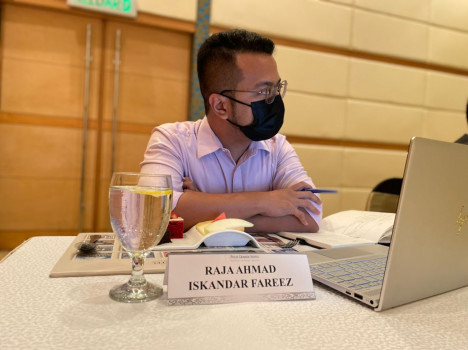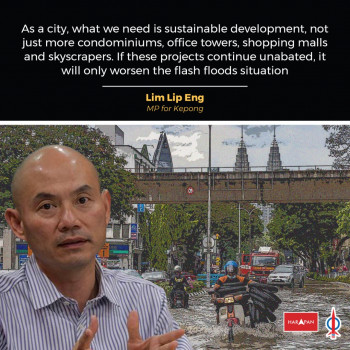by Ravinder Singh
Goodness gracious! No one can be arrested until a crime is committed. This is what Najib is reported to have said: “How do you arrest somebody if that person has not committed a crime? If it’s on a mere suspicion, it’s insufficient ground to arrest somebody on the basis of preventive laws.”
So without the dead bodies to be produced as exhibits proving a crime had been committed, nothing could be done! When criminals carry weapons it is not a crime as they have not used them to commit a crime. When they plan and make other preparations to commit a crime (say a kidnap, robbery, housebreaking, etc.), it is a matter of their freedom to make such plans and preparations.
When that man in Sungai Petani was assaulted and injured sometime in the mid 80s, it was still not a crime as he was still alive, so the IO, an inspector, simply changed the man’s statement “telah pukul saya” into “telah cuba pukul saya”. Similarly, a broad daylight snatch theft in Kulim about 10 years ago was not a crime as the policeman taking the report decided it should be “beg tangan saya telah tercicir” instead of what was reported, i.e. “ragut”.
On the roads, over-laden lorries are not committing any offence if they stop and park on the roadside before reaching the JPJ roadblock. They are only committing an offence if they drive up to the roadblock. It is not illegal for motor workshops to carry out illegal modifications on motor vehicles. The offence of driving an illegally modified vehicle is committed only when the driver drives it up to a JPJ roadblock, and it is the drive that is in the wrong.
There is no indiscipline in a school until a teacher is assaulted by some students and the incident gets into the news. Otherwise it is a good school without any discipline problem. Once I actually heard a primary school head saying that as the school was practicing democracy, the children had a right to do what they liked, i.e. the school had no business to restrict children by controlling what they could and could not do in school.
So there we go. In Malaysia democracy has been turned on its head to mean the freedom to do anything one likes regardless of the laws. No wonder it is SOP in road safety matters to get responses to requests such as for traffic lights at a junction, that “so far no deaths have taken place at the junction”, or “only one or two deaths so far” and therefore there is no justification for putting up the lights yet.
Do our laws have no provisions to deal with possible foreseeable consequences? Then why are people caught carrying drugs put behind bars or even sent to the gallows? The drugs they are carrying have not injured anyone yet. It is a mere suspicion, is it not?
What crime did the dog-trainer lady commit for her to be taken from Kuala Lumpur to Segamat and remanded there when police SOP is that while anyone can make a report at any police station, it will be investigated by the IO in charge of the area where the incident happened?
The crime situation reflects the quality of our police force just like the discipline situation in schools reflects the quality of school administration. It is not the repeal of the EO that has seen the surge of violence. All those remanded without trial under the EO were supposed to have been rehabilitated. What happened to the rehabilitation? Why did it fail? Who should be held responsible for the failure?
Just like little children assess their teachers for what they are, i.e. with whom they can get away with their pranks and with whom they cannot, similarly the bad guys in society assess the police to see whether they will be stopped in their tracks or could get away with murder, literally.
What they have seen is that they can get away with murder, as in many cowboy style shootings since Dr Joe Fernandez was shot in Bukit Mertajam years ago, no arrest has been reported yet. As for those that the police have shot dead, there is no knowing what their actual involvement in crime was. How did the police ascertain their involvement in such and such a case without interrogating them?
What made the policemen of the past so outstanding? Their physique, their training, their moral values, their superiors,…? There were times when the underworld feared the police. What has eroded that fear of the police? This loss of fear of the police by the underworld is the root of the rise in crime, not the repeal of the EO. This did not happen all of a sudden, but over a period of time, just like school indiscipline in secondary schools starts years earlier in the primary schools.
Why are the crime researchers not looking at this but taking for granted that the police force is as good as it was in the 50s? Of course there are other reasons like poverty. But why has the police not been keeping up with the times? It should be keeping itself ahead of the criminals, not lagging far behind. Now the criminals have obviously overtaken the police.
Perhaps it is the administration style known as “management by complaints” that is the cause of the problem. This style assumes that everything is fine if no complaints are made. When people complain, they are not taken seriously, thus discouraging others from complaining. What is even worse is that those who complain, the whistleblowers, are harassed and treated as criminals.
The idea is to discourage people from complaining so that other people can be told the low number of complaints proves that things are very good. This is what police statistics were made to show while the rot was going on. People were literally being scolded for their “perception” of increasing crime when official figures were showing otherwise. Now the blame is on the EO. What next?
* The views expressed in this article are the personal opinion of the columnist and this article first appeared in Free Malaysia Today



